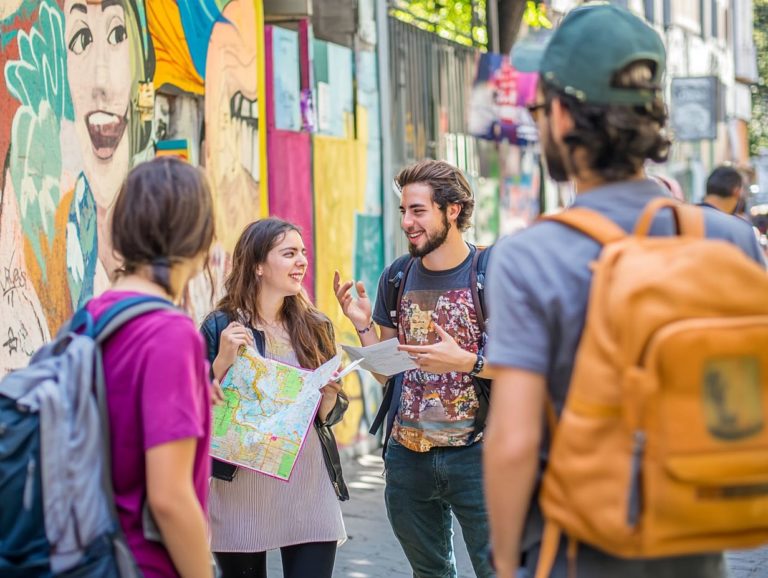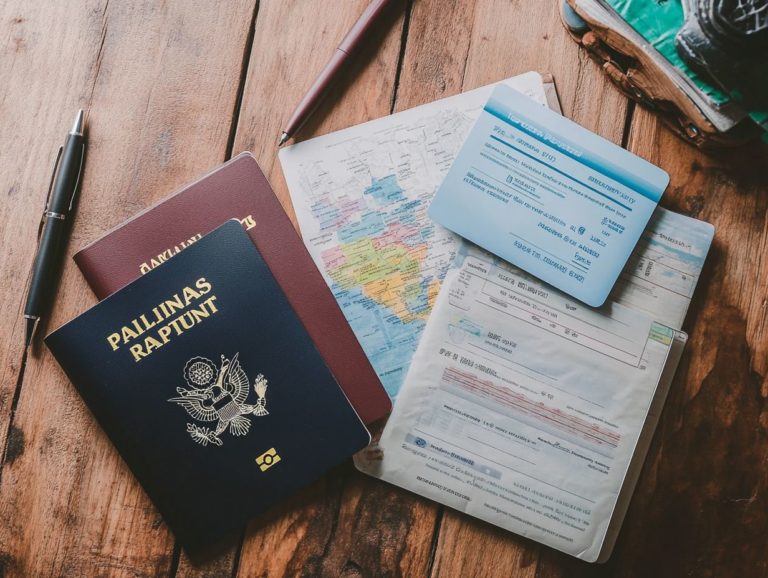What to Do When You Get Lost Abroad
Traveling is one of life’s greatest adventures. Even seasoned explorers can feel lost in unfamiliar places. Stay calm, and get ready for an adventure!
This guide equips you with insights on how to effectively research your destination before departure, craft a practical travel itinerary, and navigate unexpected moments when you veer off course.
From utilizing new technology to prioritizing your safety, you ll discover tips that ensure your journeys stay enjoyable, even when they take an unexpected turn.
We will share strategies to help you sidestep the chance of getting lost in the future. Jump in and take charge of your travels today!
Contents
Key Takeaways:
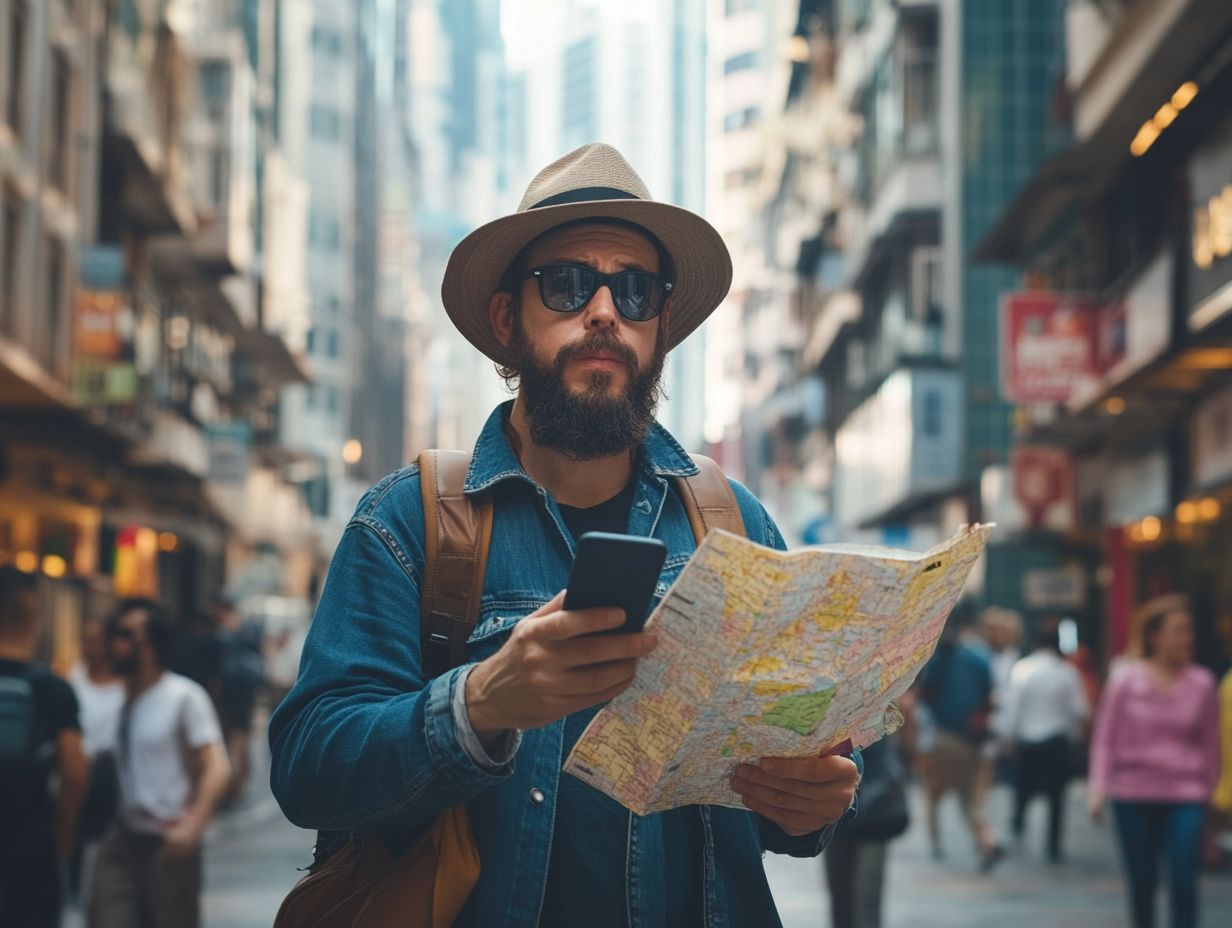
- Do your research and plan your itinerary beforehand to avoid getting lost abroad.
- Stay calm and assess the situation when you first realize you’re lost.
- Utilize technology, such as GPS and maps, and ask for help from locals to find your way.
Preparation Before Travel
Preparing for travel is essential for ensuring a seamless journey. It involves key steps that equip you to navigate unfamiliar places with confidence.
By researching your destination and familiarizing yourself with the local language, you can elevate your travel experiences significantly. Embrace smartphone apps, craft a detailed travel itinerary, and consider investing in travel insurance these elements will help you navigate urban landscapes, particularly at iconic landmarks across diverse regions like Eastern Europe and Central Asia.
Researching the Destination
Researching your destination is an essential part of travel preparation. It helps you uncover local attractions and enhance your travel experiences.
Dive into various research methods. Use platforms like Trip Advisor to access firsthand reviews and recommendations from fellow travelers. This insight helps you pinpoint popular spots worth visiting and discover hidden gems that might elude the typical tourist gaze.
Understanding local customs and traditions is crucial. Being aware can enhance your interactions and help you avoid misunderstandings.
Employ common sense while navigating a foreign country. Be mindful of pickpocketing hotspots, like crowded markets or tourist attractions, and local dining etiquette to ensure a safe and enjoyable journey.
Thorough research enables informed decisions, ultimately leading to richer and more memorable travel experiences.
Creating a Travel Itinerary
Creating a travel itinerary can elevate your exploration. It provides a structured framework for your adventures while helping you maintain a sense of calm and organization throughout your journey.
Plan your activities thoughtfully to ensure each day is filled with captivating experiences. However, remain flexible to allow space for the unexpected. This balance opens the door to spontaneous discoveries often the highlights of any journey.
Using smartphone apps for itinerary management can simplify this process. They offer real-time updates and convenient access to essential information at your fingertips. Joining a tourist group or opting for guided tours can streamline your experience, eliminating the stress of planning and allowing you to fully immerse yourself in the culture and beauty of your destination.
What to Do When You First Realize You’re Lost
Getting lost in a new place can be shocking. But don t panic stay calm and assess your surroundings.
Begin by recalling your journey so far. This can offer invaluable context. Resist the urge to panic and gather information from nearby street signs or friendly locals. This can make all the difference in regaining your footing.
Staying Calm and Assessing the Situation
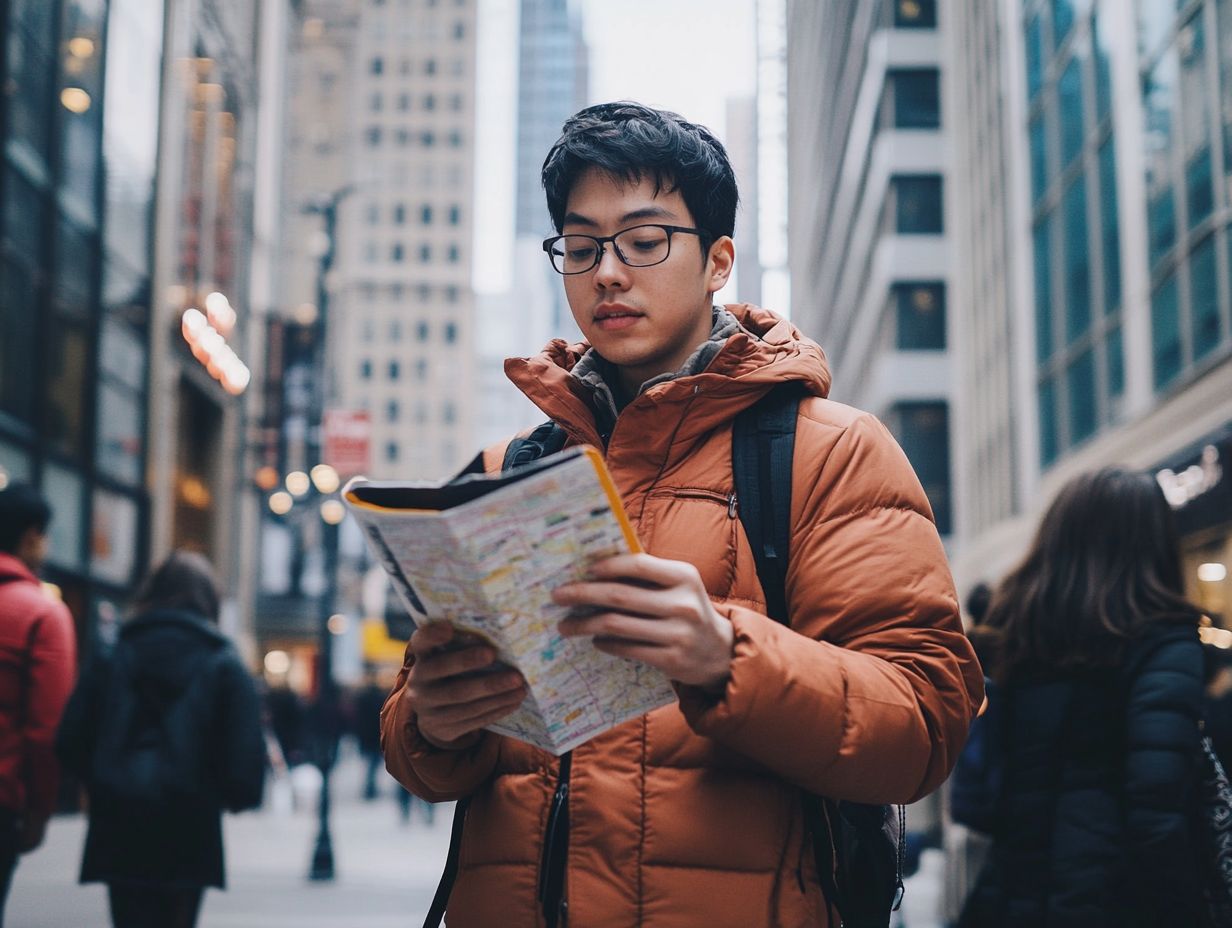
Staying calm and methodically assessing the situation is essential when you first realize you’re lost. This ability directly impacts your effectiveness in navigating your surroundings.
In those moments of disorientation, practicing mindfulness can significantly help you regain your composure. Mindfulness invites you to concentrate deeply on the present, clearing your mind and allowing you to approach the situation with clarity.
Employing breathing exercises can also stabilize your emotions and reduce anxiety. By taking slow, deliberate breaths, you can enhance your mental state.
It s vital to assess your surroundings. Identifying familiar landmarks can provide you with valuable context and direction.
If you find yourself in need of assistance, don t hesitate to reach out for help. Use communication tools like your mobile phone to connect with others. This ensures you get the support you need readily available.
Using Technology to Find Your Way
Leveraging technology to navigate can profoundly alleviate stress and elevate your travel experience. This is particularly helpful when you’re traversing the winding streets of a foreign land.
With the power of GPS (Global Positioning System) and sophisticated smartphone applications at your fingertips, you can effortlessly access offline maps. These maps will guide you through urban landscapes.
Using an eSIM, a type of SIM card that allows you to connect to the internet without needing a physical card, helps ensure you stay connected wherever you roam. A translation app seamlessly bridges the communication gap when seeking directions.
Using GPS and Maps
Using GPS technology through applications like Google Maps can be your ultimate companion when navigating the intricate landscapes of a city. This powerful tool gives you real-time directions and allows you to download maps for offline use.
With offline maps, you won t lose your way in areas with spotty connectivity. For those who may not speak the local language, multilingual maps are a game-changer. You can easily switch languages based on your preferences, enhancing your overall travel experience.
By leveraging GPS features, you can easily pinpoint notable attractions, restaurants, and other points of interest. This enables you to explore new environments with confidence and efficiency.
Asking for Help from Locals
Asking for help from locals can significantly enhance your ability to navigate unfamiliar streets. Being armed with basic phrases in the local language makes a difference.
Making the effort to communicate in the local tongue establishes a friendly rapport. This often leads to more accurate and helpful responses. Simple phrases like “Excuse me, where is…?” or “Can you help me find…?” can truly make a difference in your interactions.
Using translation apps becomes increasingly essential when dealing with taxi drivers or hotel staff. These apps serve as a bridge in understanding, ensuring your destination is clearly conveyed.
For example, typing in “Please take me to this address” confirms that the driver understands your request, minimizing the chances of miscommunication that could derail your travel plans.
Staying Safe While Lost
Prioritizing safety while navigating unfamiliar territory is essential. It demands a keen sense of awareness and vigilance regarding your surroundings to sidestep any potentially perilous situations that may arise.
Avoiding Dangerous Situations
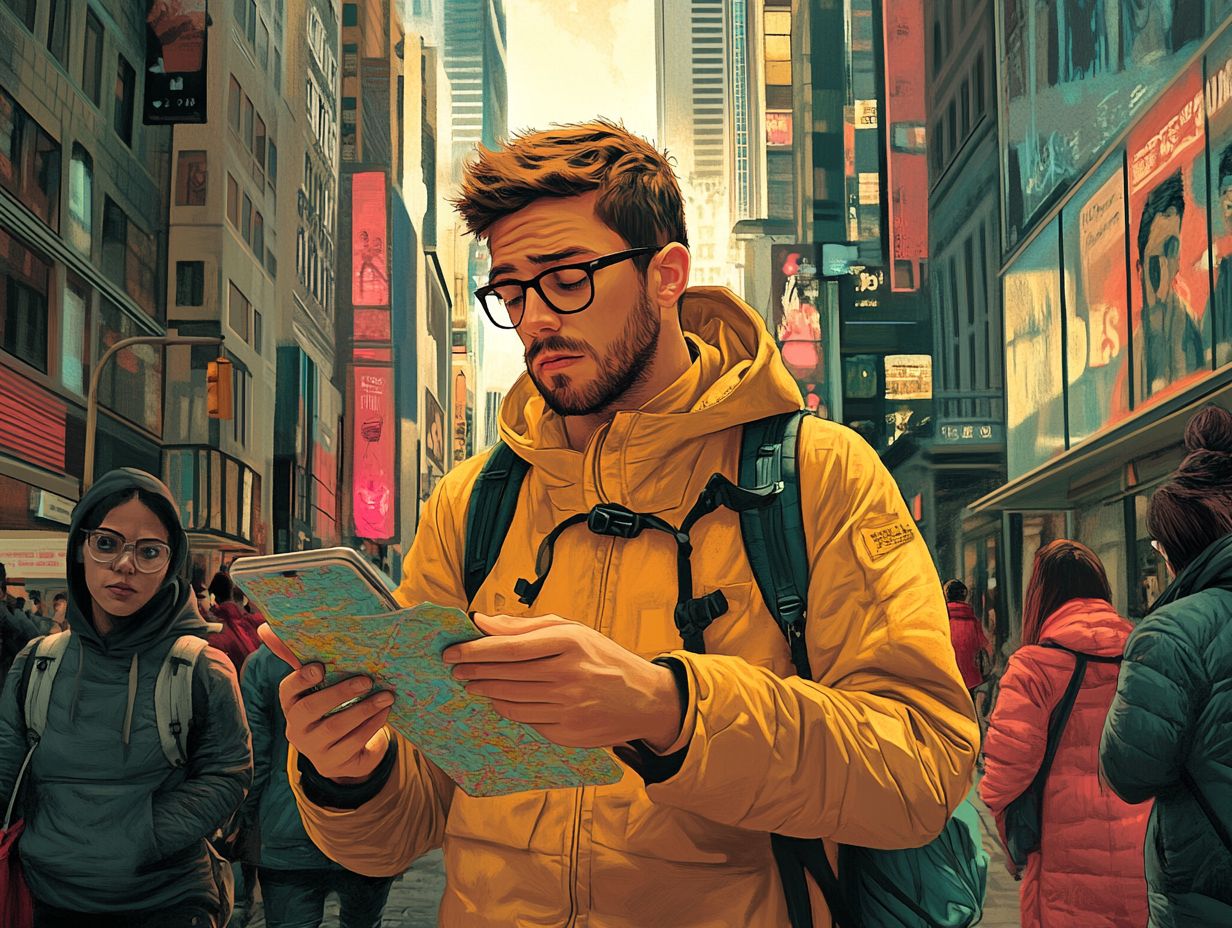
Avoiding dangerous situations is essential for your safety when you find yourself lost. It requires a sharp sense of common sense and awareness of potential risks.
Staying in well-lit areas is one of the simplest yet most effective strategies for minimizing threats. Light tends to deter crime and improves visibility. Keeping an eye on your surroundings allows you to spot any unusual or potentially hazardous behaviors that might raise red flags.
If anxiety creeps in due to disorientation, mastering techniques to manage panic becomes vital. Practicing deep, measured breaths can help alleviate feelings of overwhelm and restore a sense of control.
Engaging with your environment whether by noting landmarks or positively interacting with those nearby can ground you during unsettling moments. This transforms tension into a proactive approach to ensuring your safety.
Keeping Important Documents and Money Secure
Secure your important documents and money while traveling. Unexpected incidents can disrupt your journey.
To ensure peace of mind, consider employing strategies designed to safeguard your valuables. Using bags made to prevent theft with lockable zippers or technology that stops unauthorized access to your personal information can significantly diminish the risk of theft.
Hotel safes provide a reliable way to securely store your documents and cash while you re out exploring.
Thinking ahead can be a game-changer! Investing in travel insurance not only covers lost or stolen items but also offers extra security against unforeseen emergencies, allowing you to focus on fully enjoying your adventures.
Preventing Getting Lost in the Future
To prevent getting lost in the future, focus on honing your navigation skills and applying effective travel strategies. These approaches will significantly enhance your familiarity with new destinations, ensuring that you feel confident and at ease as you explore.
Tips for Staying Oriented in a New Place
Tips for staying oriented in a new place can greatly boost your confidence as you navigate unfamiliar streets. This allows you to explore your surroundings with ease.
One effective strategy is to identify prominent landmarks think unique buildings, statues, or natural features that can serve as your reference points. These visual cues will help you gauge direction, especially when all the streets seem to blend together.
Trusting your common sense while navigating can lead to intuitive decisions. For instance, choosing routes that appear busier can enhance both your safety and accessibility.
The emergence of smartphone apps offering real-time guidance and detailed maps has transformed the way you navigate. These tools not only provide step-by-step directions but also adapt to live traffic conditions, enabling more informed travel choices.
By blending traditional navigation techniques with modern technology, you empower yourself to venture confidently into the unknown, enriching your overall experience.
Creating a Backup Plan for Emergencies
Creating a backup plan for emergencies is a smart move in travel preparation. This can alleviate stress and enhance your safety during your journey.
Your plan should include essential components, like having emergency contacts readily accessible both local and back home. This ensures you can establish communication quickly if the need arises.
It s crucial to familiarize yourself with communication tools, such as mobile apps and local emergency numbers. This knowledge ensures you can utilize them effectively in various situations.
Recognizing the importance of travel insurance can significantly enhance your peace of mind. This allows you to navigate unforeseen incidents with greater confidence. Coverage for unexpected medical expenses or trip cancellations can ease financial worries, paving the way for a more enjoyable travel experience.
Frequently Asked Questions
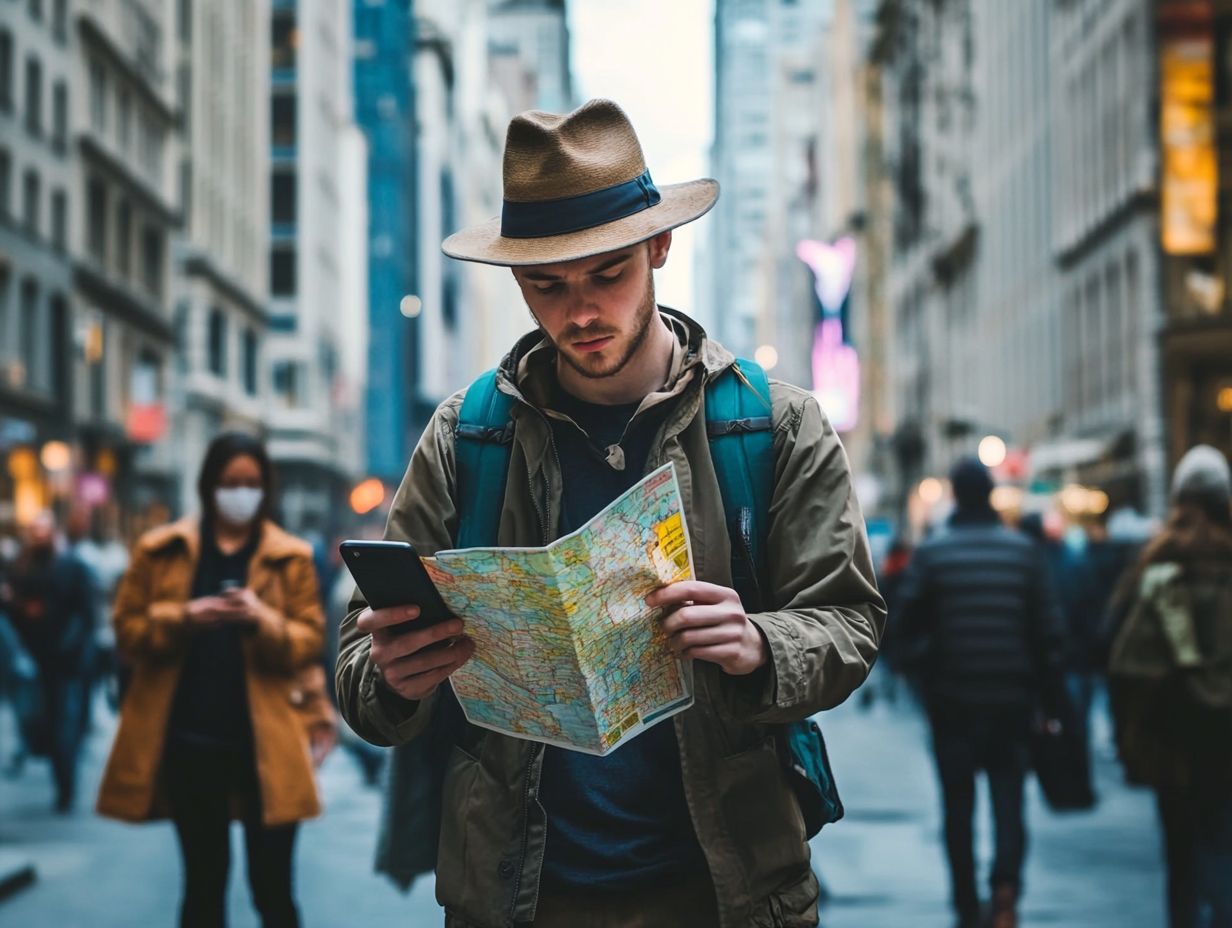
Being prepared when traveling is essential. Here are some frequently asked questions.
What should I do if I get lost while traveling abroad?
If you find yourself lost while traveling abroad, stay calm. Try to retrace your steps. If that doesn’t work, seek help from locals or go to a nearby police station or tourist information center.
Should I have a plan if I get lost abroad?
Yes! Always have a plan for getting lost while traveling. This includes carrying a map, having a working phone with international service, and knowing local emergency numbers.
What if I don’t speak the local language?
Look for someone who speaks English or is willing to help. You can also use translation apps or show a picture of your hotel or a landmark.
Is it safe to ask strangers for directions?
It s usually safe! Trust your instincts if you feel uneasy, go to a nearby store for help.
My phone isn’t working. What now?
Find a payphone or ask someone to make a call for you. If that fails, head to a police station or tourist information center for help.
How can I avoid getting lost abroad?
Research the area before you go! Carry a map and always have a backup plan just in case you do get lost.

